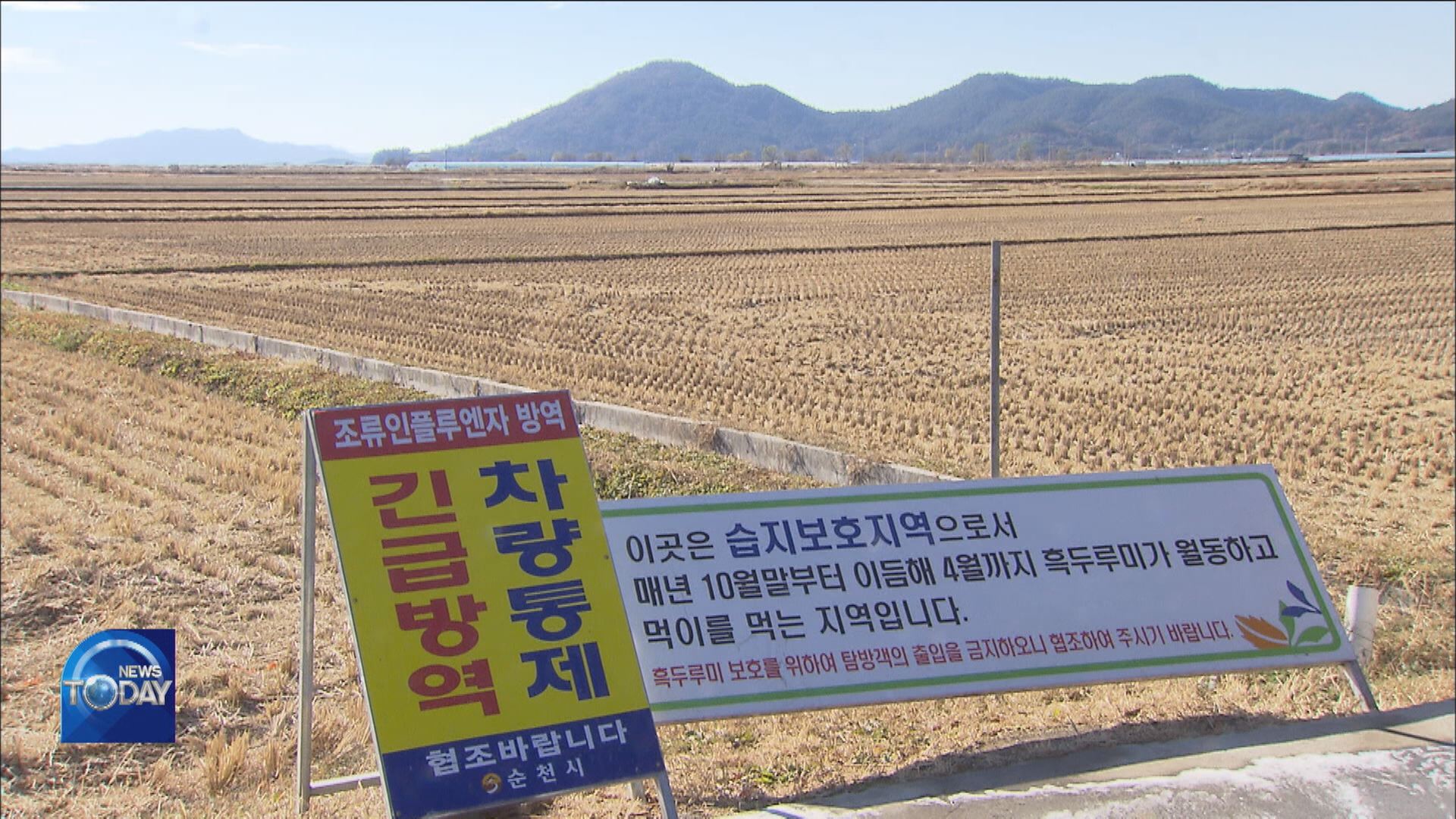SPREAD OF AVIAN INFLUENZA VIRUS
입력 2020.12.10 (15:02)
수정 2020.12.10 (16:45)
읽어주기 기능은 크롬기반의
브라우저에서만 사용하실 수 있습니다.
[Anchor Lead]
The avian influenza virus found in a duck farm in Naju, Jeollanam-do Province last Tuesday was also determined to be highly pathogenic. The main duck producing region of Jeollanam-do is on alert as highly contagious bird flu was confirmed in Naju, four days after the virus was detected in Yeongam on December 5th.
[Pkg]
This is a duck farm in Naju where avian influenza virus was found during a full-scale screening on December 8th. A detailed analysis determined the virus to be highly pathogenic. As a preventive measure, the provincial government of Jeollanam-do plans to cull some 460,000 chickens and ducks within a three-kilometer radius, including32,000 ducks in this farm. Also, a standstill order was issued for 52 poultry farms within a 10-kilometer range. This farm in Naju belongs to the same company as the one in Yeongam where the same highly pathogenic AI strain was discovered earlier. The Jeollanam-do provincial government reported that 59 other affiliated poultry farms tested negative for this strain of bird flu.
[Soundbite] LEE YONG-BO(ANIMAL HEALTH DIVISION, JEOLLANAM-DO PROVINCIAL GOV’T) : "Two AI incidents occurred in duck farms. So the movement of people and vehicles will be restricted by setting up checkpoints at all 180 duck farms in the province."
Wild bird feces collected from Suncheon Bay and the Gomakwoncheon River in Hampyeong earlier this month were also found to contain highly pathogenic AI virus. Judging from the past bird flu incidents, an outbreak of highly pathogenic AI among wild fowls often leads to AI cases in nearby farms as fast as within two weeks time frame, causing concerns for more cases in the vicinity. Jeollanam-do, Korea’s largest duck growing region is alarmed as a string of highly pathogenic AI outbreaks occurred in the duck farms and wild birds.
The avian influenza virus found in a duck farm in Naju, Jeollanam-do Province last Tuesday was also determined to be highly pathogenic. The main duck producing region of Jeollanam-do is on alert as highly contagious bird flu was confirmed in Naju, four days after the virus was detected in Yeongam on December 5th.
[Pkg]
This is a duck farm in Naju where avian influenza virus was found during a full-scale screening on December 8th. A detailed analysis determined the virus to be highly pathogenic. As a preventive measure, the provincial government of Jeollanam-do plans to cull some 460,000 chickens and ducks within a three-kilometer radius, including32,000 ducks in this farm. Also, a standstill order was issued for 52 poultry farms within a 10-kilometer range. This farm in Naju belongs to the same company as the one in Yeongam where the same highly pathogenic AI strain was discovered earlier. The Jeollanam-do provincial government reported that 59 other affiliated poultry farms tested negative for this strain of bird flu.
[Soundbite] LEE YONG-BO(ANIMAL HEALTH DIVISION, JEOLLANAM-DO PROVINCIAL GOV’T) : "Two AI incidents occurred in duck farms. So the movement of people and vehicles will be restricted by setting up checkpoints at all 180 duck farms in the province."
Wild bird feces collected from Suncheon Bay and the Gomakwoncheon River in Hampyeong earlier this month were also found to contain highly pathogenic AI virus. Judging from the past bird flu incidents, an outbreak of highly pathogenic AI among wild fowls often leads to AI cases in nearby farms as fast as within two weeks time frame, causing concerns for more cases in the vicinity. Jeollanam-do, Korea’s largest duck growing region is alarmed as a string of highly pathogenic AI outbreaks occurred in the duck farms and wild birds.
■ 제보하기
▷ 카카오톡 : 'KBS제보' 검색, 채널 추가
▷ 전화 : 02-781-1234, 4444
▷ 이메일 : kbs1234@kbs.co.kr
▷ 유튜브, 네이버, 카카오에서도 KBS뉴스를 구독해주세요!
- SPREAD OF AVIAN INFLUENZA VIRUS
-
- 입력 2020-12-10 15:02:10
- 수정2020-12-10 16:45:43

[Anchor Lead]
The avian influenza virus found in a duck farm in Naju, Jeollanam-do Province last Tuesday was also determined to be highly pathogenic. The main duck producing region of Jeollanam-do is on alert as highly contagious bird flu was confirmed in Naju, four days after the virus was detected in Yeongam on December 5th.
[Pkg]
This is a duck farm in Naju where avian influenza virus was found during a full-scale screening on December 8th. A detailed analysis determined the virus to be highly pathogenic. As a preventive measure, the provincial government of Jeollanam-do plans to cull some 460,000 chickens and ducks within a three-kilometer radius, including32,000 ducks in this farm. Also, a standstill order was issued for 52 poultry farms within a 10-kilometer range. This farm in Naju belongs to the same company as the one in Yeongam where the same highly pathogenic AI strain was discovered earlier. The Jeollanam-do provincial government reported that 59 other affiliated poultry farms tested negative for this strain of bird flu.
[Soundbite] LEE YONG-BO(ANIMAL HEALTH DIVISION, JEOLLANAM-DO PROVINCIAL GOV’T) : "Two AI incidents occurred in duck farms. So the movement of people and vehicles will be restricted by setting up checkpoints at all 180 duck farms in the province."
Wild bird feces collected from Suncheon Bay and the Gomakwoncheon River in Hampyeong earlier this month were also found to contain highly pathogenic AI virus. Judging from the past bird flu incidents, an outbreak of highly pathogenic AI among wild fowls often leads to AI cases in nearby farms as fast as within two weeks time frame, causing concerns for more cases in the vicinity. Jeollanam-do, Korea’s largest duck growing region is alarmed as a string of highly pathogenic AI outbreaks occurred in the duck farms and wild birds.
The avian influenza virus found in a duck farm in Naju, Jeollanam-do Province last Tuesday was also determined to be highly pathogenic. The main duck producing region of Jeollanam-do is on alert as highly contagious bird flu was confirmed in Naju, four days after the virus was detected in Yeongam on December 5th.
[Pkg]
This is a duck farm in Naju where avian influenza virus was found during a full-scale screening on December 8th. A detailed analysis determined the virus to be highly pathogenic. As a preventive measure, the provincial government of Jeollanam-do plans to cull some 460,000 chickens and ducks within a three-kilometer radius, including32,000 ducks in this farm. Also, a standstill order was issued for 52 poultry farms within a 10-kilometer range. This farm in Naju belongs to the same company as the one in Yeongam where the same highly pathogenic AI strain was discovered earlier. The Jeollanam-do provincial government reported that 59 other affiliated poultry farms tested negative for this strain of bird flu.
[Soundbite] LEE YONG-BO(ANIMAL HEALTH DIVISION, JEOLLANAM-DO PROVINCIAL GOV’T) : "Two AI incidents occurred in duck farms. So the movement of people and vehicles will be restricted by setting up checkpoints at all 180 duck farms in the province."
Wild bird feces collected from Suncheon Bay and the Gomakwoncheon River in Hampyeong earlier this month were also found to contain highly pathogenic AI virus. Judging from the past bird flu incidents, an outbreak of highly pathogenic AI among wild fowls often leads to AI cases in nearby farms as fast as within two weeks time frame, causing concerns for more cases in the vicinity. Jeollanam-do, Korea’s largest duck growing region is alarmed as a string of highly pathogenic AI outbreaks occurred in the duck farms and wild birds.
이 기사가 좋으셨다면
-
좋아요
0
-
응원해요
0
-
후속 원해요
0

















이 기사에 대한 의견을 남겨주세요.